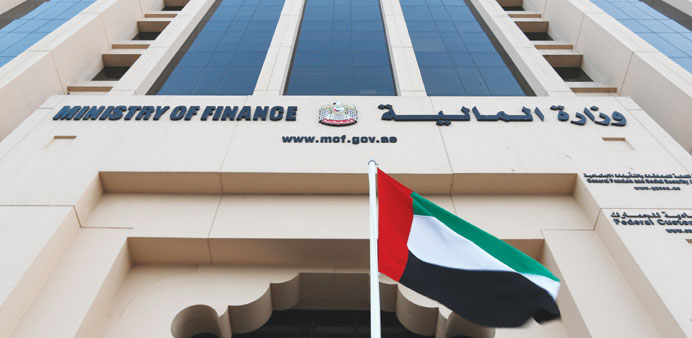The national flag of the UAE flies outside the Ministry of Finance headquarters in the Al Ghubaiba creek district of Dubai (file). UAE officials have said in the past that VAT is unlikely to be introduced before adjacent countries adopt it too.
Reuters/Abu Dhabi/Dubai
The UAE, seeking to bolster state revenues, is likely to complete the drafting of laws introducing corporate tax and value-added tax in the third quarter of this year, a senior Ministry of Finance official said yesterday.
“The draft of the corporate tax law and the value-added tax law has been discussed with the local and federal governments,” Younis Haji al-Khouri, under-secretary at the ministry, told Reuters.
He added that authorities were still evaluating the social and economic impact of the laws, but drafting was expected to be finished “very soon, within the third quarter of this year”.
Al-Khouri declined to comment on the proposed tax rates or when they might take effect. There are often gaps of many months or years between the drafting of UAE laws and their going into effect upon approval by the president.
Introducing corporate tax and VAT in the UAE, which has promoted its low-tax environment to investors, would be a major shift in policy, and sensitive.
Officials have said in the past that VAT is unlikely to be introduced before adjacent countries adopt it too. Otherwise, the UAE’s competitiveness could be hurt and there might be a surge in smuggling across borders. Neighbouring countries are discussing plans for VAT but do not have a firm timetable.
Last year’s plunge in oil prices has hurt the finances of even wealthy Gulf states such as the UAE, pressing them to consider new ways of raising revenue.
The UAE will this year post its first consolidated fiscal deficit since 2009, the International Monetary Fund projects; it sees the budget swinging to a deficit of 2.3% of gross domestic product from a 5.0% surplus last year.
The IMF has urged the UAE to consider introducing excise taxes and a uniform corporate tax for both local and foreign firms. At present there is little corporate taxation outside the oil sector, apart from a 20% levy on foreign banks in Dubai.
Zeine Zeidane, head of the IMF mission to the UAE, told Reuters last month that a UAE corporate tax could be introduced at a lower rate, initially to accustom the government to running a national tax system.
A UAE Ministry of Finance report released yesterday said the cabinet had approved versions of the corporate tax and VAT draft laws. It said the ministry was working on the creation of a federal tax authority, but did not say when the body might start operating.
Separately, Kuwait is considering issuing bonds among various options to finance a budget deficit created by low oil prices, Finance Minister Anas al-Saleh said yesterday.
“Going to the market and issuing bonds and so on, could it happen this year? Possibly yes,” he said in an interview with Al Arabiya television. “A specialised team at the central bank are studying this issue and the decisive factor will be what’s best for the country, in addition to the economic benefit to the markets.”
Al-Saleh did not specify if Kuwait was considering international or domestic bonds. The government does not have outstanding dollar bonds and has only a modest amount of domestic debt.
Figures showing a budget deficit of 2.31bn dinars ($7.6bn) in the last fiscal year to March 31, the first deficit since 1999/2000, came as a surprise, al-Saleh said. The preliminary figures were released on Wednesday.

